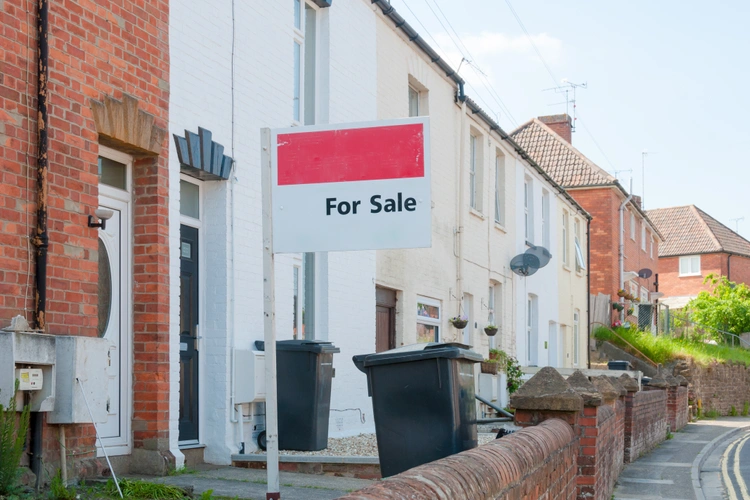Do I have to pay back a secured loan before I move house?
You do usually have to pay back a homeowner loan before you sell your home and move. This is because the loan is secured against the property in question.
You can either:
- pay back your secured loan outright before you sell your house
- or you can pay it back from the proceeds of the sale
It’s also important to note that while you can put your house up for sale with a secured loan, your existing mortgage company has the right to prevent the sale from going ahead if they don’t agree to it. So, it’s best to check with your current mortgage company first and get a mortgage in principle from your new mortgage provider too.
Once your house has sold, the outstanding balances against your property will be paid in this order:
- mortgage (because this is the ‘first charge’ against your home)
- secured loan (because it’s the ‘second charge’).
It may be possible to find a lender that will allow you to transfer the loan to your new property. Whether this option is available will also depend on your individual circumstances, including your affordability, the value of your new house, and the size of your deposit.
What happens if my house sells for less than I owe?
If your house is worth less than you owe on your mortgage and/or secured loan, then you are in negative equity. This means if you were to sell your house, you’d still owe an outstanding balance. If you appear to be in negative equity, then you may have a few courses of action available to you, including:
- waiting for your equity to increase over time (e.g., if your house price increases)
- making overpayments towards your secured loan or mortgage to get your outstanding balance down
- building up savings to put towards your deposit on a new home
Because the options can vary depending on your circumstances, it’s important to speak to a mortgage adviser before you put your property on the market.
Can I pay off a secured loan early?
You could pay off a secured loan early if it’s affordable to do so. To find out how much you owe in total, you’ll need to get in touch with your lender to request an early settlement figure.
Bear in mind that you could incur early repayment charges if you clear the balance before your agreement ends. The lender or broker should go through any fees with you before you enter into an agreement, so you should be aware of any charges from the start. If you’re unsure, your lender will be able to tell you if these charges apply.
1. Use savings
You may be able to pay off your secured loan with personal savings. This will help you to avoid the need to borrow money in the future and will reduce any interest you pay. To build up a savings pot, you could set up a standing order to automatically transfer a set amount each month to your savings account.
2. Use proceeds from your house sale
Clearing the balance with the funds you get from your house sale could be one option to consider. Bear in mind that this may eat into your deposit for your next mortgage. So, you need to check if this will be affordable, before you go ahead.
3. Transfer secured loan to your new property
Alternatively, you could transfer the loan to your new property. As we said, not all lenders offer this option, but some do, so it’s worth checking. This will stop you from having to pay early repayment charges, but you may face admin fees from the lender for transferring the loan.
You’d also need to check whether it’d be a straight swap or whether you’d need to renegotiate the terms of your loan. If you do need to renegotiate, there’s the risk that your interest rate and loan term could increase, meaning you’d pay more in total.
Can a secured loan be written off?
It’s exceptionally rare for secured loans to be written off. This is because secured loans tend to be for large amounts, and writing them off would be a big loss for the lender.
Secured loans are classed as priority debts, which means that the consequences of not paying them can be severe. It’s essential that you make your secured loan repayments to avoid facing the possibility of repossession, or seek help if you are unable to do this. If you decide to move house, you need to plan to either pay it in full or transfer the loan to your new property, if this is an option that your lender agrees to).
What happens if I don't pay back a secured loan?
If you fail to make your repayments or pay back a secured loan, there can be serious consequences - your lender has the right to repossess and then sell your home to get their money back (as a last resort).
Initially, the lender will contact you to encourage you to make a payment. If you still fail to do so, interest and charges will be applied, then a default may be registered on your credit file. If you still don’t pay, then a County Court Judgement (CCJ) may be applied. The last resort would then be a repossession.
If you’re struggling to make your repayments, don’t hesitate to get free debt advice from organisations like Citizen’s Advice or StepChange.
Will a secured loan affect my mortgage?
A secured loan won’t affect your mortgage application on your new house if the loan is paid in full before you apply. But if you keep the loan and transfer it to your new property, then it could affect your affordability for a new mortgage, as you’ll need to keep paying the loan on top of your mortgage.
Read our helpful guides to learn more about loans.
Secured Loans from £10,000 to £500,000
- Check if you’re eligible before you apply
- We compare 100s of secured loans
- Getting a secured loan quote won’t affect your credit score
Secured loans are secured against your property.

Disclaimer: We make every effort to ensure content is correct when published. Information on this website doesn't constitute financial advice, and we aren't responsible for the content of any external sites.






